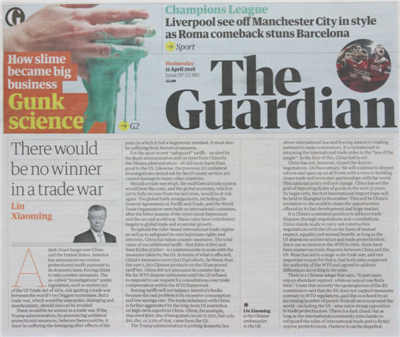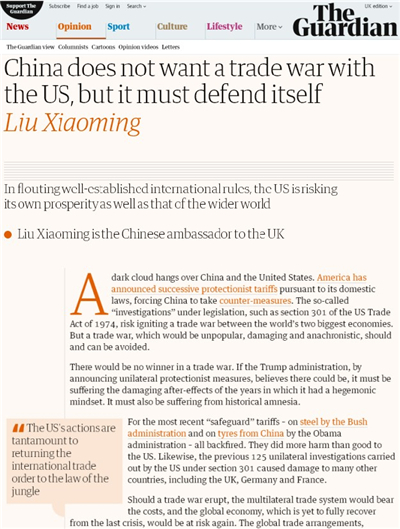The Guardian Published a Signed Article by Ambassador Liu Xiaoming Criticizing the US for Provoking Trade Conflicts with China
chinadaily.com.cn | Updated: 2018-04-12 05:31

On 11 April 11 2018, the Guardian published a signed article by Ambassador Liu Xiaoming entitled There Would Be No Winner in a Trade War. The newspaper's website also published the article with the title China Does Not Want a Trade War with the US, but It Must Defend Itself. The full text is as follows:
A dark cloud hangs over China and the United States. America has announced successive protectionist tariffs pursuant to its domestic laws, forcing China to take counter-measures. The so-called "investigations" under legislation, such as section 301 of the US Trade Act of 1974, risk igniting a trade war between the world's two biggest economies. But a trade war, which would be unpopular, damaging and anachronistic, should and can be avoided.
There would be no winner in a trade war. If the Trump administration, by announcing unilateral protectionist measures, believes there could be, it must be suffering the damaging after-effects of the years in which it had a hegemonic mindset. It must also be suffering from historical amnesia.
For the most recent "safeguard" tariffs -- on steel by the Bush administration and on tyres from China by the Obama administration -- all backfired. They did more harm than good to the US. Likewise, the previous 125 unilateral investigations carried out by the US under section 301 caused damage to many other countries, including the UK, Germany and France.
Should a trade war erupt, the multilateral trade system would bear the costs, and the global economy, which is yet to fully recover from the last crisis, would be at risk again. The global trade arrangements, including the General Agreement on Tariffs and Trade of 1947, and the World Trade Organisation, established in 1995, were built on international consensus, after the bitter lessons of the 1930s Great Depression and the second world war. These rules have contributed hugely to global trade and economic growth. All countries, including the US, must cherish and safeguard those achievements.
To uphold the rules-based international trade regime as well as to safeguard its own legitimate rights and interests, China has taken counter-measures. The total value of our additional tariffs -- first $3bn (£2bn) and then $50bn (£35bn) -- is commensurate in scale with the measures taken by the US. In terms of what is affected, China's measures cover 234 US products, far fewer than the over 1,300 Chinese products on the US proposed tariff list. China did not announce its counter list or file for WTO dispute settlement until the US refused to respond to our request for consultations over trade compensation within the WTO framework.
Raising tariffs will not balance America's books because the real problem is its excessive consumption and low savings rate. The trade imbalance with China is further aggravated by the long-term US restriction on high-tech exports to China. China, for example, imported $260.1bn of integrated circuit in 2017, but only $10.2bn, or 3.9% of that, came from the US.
The Trump administration is putting domestic law above international law and forcing America's trading partners to make concessions. It is tantamount to returning the international trade order to the "law of the jungle". In the face of this, China had no choice but to take firm counter actions.
China has not, however, closed the door to negotiations and consultations. On the contrary, we will continue to deepen reform and open up on all fronts with a view to building closer trade and economic partnerships with the world. This basic national policy will not change. China has set the goal of importing $24tn of goods in the next 15 years. To begin with, the first International Import Expo will be held in Shanghai in November. This will be China's invitation to the world to share the opportunities offered by its fast development and huge market.
It is China's consistent position to address trade disputes through negotiations and consultations. China stands ready to carry out constructive negotiations with the US on the basis of mutual respect, equality and mutual benefit, as long as the US abandons unilateralism and trade protectionism. Since our accession to the WTO in 2001, there have been numerous trade disputes between China and the US. None has led to a large-scale trade war, and one important reason for that is that both sides respected the authority of the WTO and agreed to address differences according to its rules.
Whoever ties the knot should untie it. The US should bear in mind the long-term and fundamental interests of both countries, as well as the need for a solid international trade order and sound world economy. The right way for the US to untie the knot is to stop playing the "zero-sum game", and return to the table of negotiations and consultations.
There is a Chinese adage that says, "A just cause enjoys abundant support, while an unjust one finds little." I note that recently the spokesperson of the EU commission said that the EU does not support measures contrary to WTO regulations, and this is echoed by an increasing number of people from all sectors around the world -- including the US -- who voice strong opposition to trade protectionism. There is a dark cloud: but as long as the international community joins hands to safeguard the rules of international trade and to firmly oppose protectionism, I believe it can be dispelled.

























